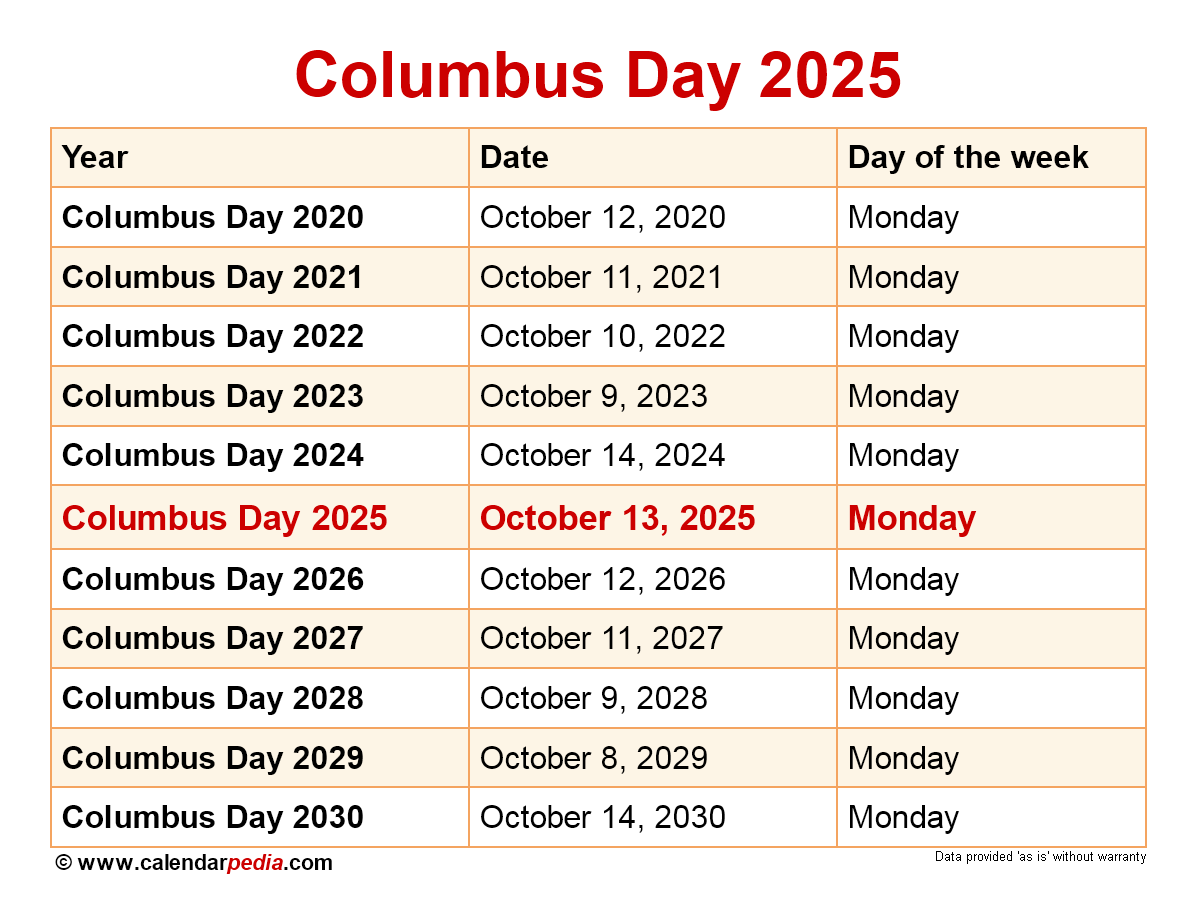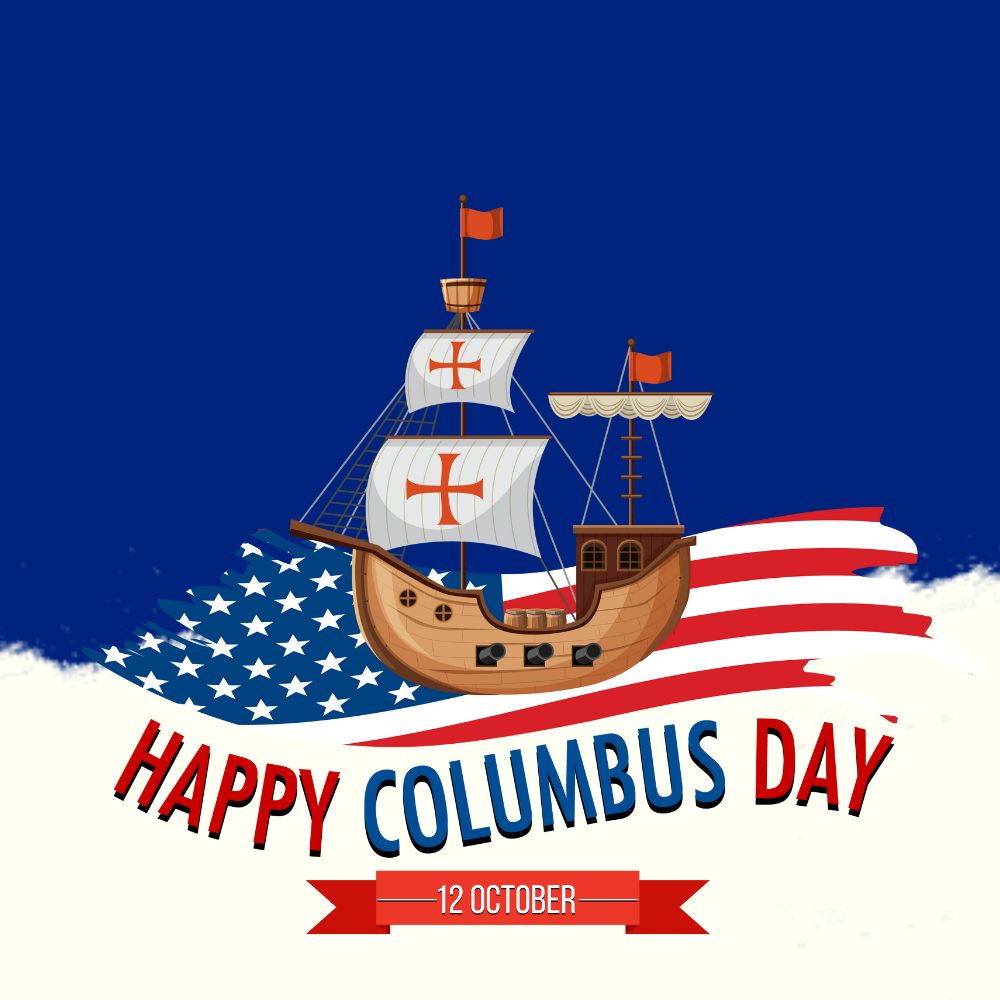A Look at the 2025 Observance of Columbus Day
Related Articles: A Look at the 2025 Observance of Columbus Day
Introduction
With great pleasure, we will explore the intriguing topic related to A Look at the 2025 Observance of Columbus Day. Let’s weave interesting information and offer fresh perspectives to the readers.
Table of Content
A Look at the 2025 Observance of Columbus Day

The annual observance of Columbus Day, falling on the second Monday of October, remains a subject of ongoing debate and discussion. While its origins are rooted in celebrating the arrival of Christopher Columbus in the Americas in 1492, the holiday has become increasingly controversial in recent years, with many calling for its replacement or re-evaluation.
The complexities surrounding Columbus Day stem from a critical reassessment of the historical narrative surrounding Columbus’s voyages. While he is often credited with "discovering" America, this narrative overlooks the existence of Indigenous peoples who had inhabited the Americas for millennia before his arrival. Moreover, Columbus’s actions, including enslavement, violence, and the introduction of diseases that decimated Indigenous populations, have led many to view the holiday as a celebration of colonialism and oppression.
In 2025, as with every year, the observance of Columbus Day will likely continue to be marked by diverse perspectives and opinions. Some will celebrate the holiday as a tribute to the explorer’s contributions to European exploration and the opening of new trade routes. Others will view it as an opportunity to reflect on the complex history of colonialism and its enduring impact on Indigenous communities.
The debate surrounding Columbus Day underscores the importance of historical understanding and critical thinking. It compels us to examine historical figures and events with nuance and to acknowledge the often-overlooked perspectives of marginalized groups.
Understanding the Perspectives
Supporters of Columbus Day often argue that the holiday represents a significant moment in history, marking the beginning of European exploration and the subsequent exchange of knowledge and culture between continents. They emphasize the role of Columbus in opening up new trade routes and fostering economic growth.
Critics of Columbus Day, on the other hand, argue that the holiday glorifies a figure responsible for the brutal exploitation and displacement of Indigenous peoples. They highlight the devastating impact of Columbus’s actions on Indigenous populations, including the introduction of diseases that led to widespread death and the forced enslavement of many.
Beyond the Debate
The debate surrounding Columbus Day presents an opportunity to engage in constructive dialogue and to learn from history. It encourages us to:
- Acknowledge the complexities of historical narratives: Examining historical figures and events through multiple lenses allows for a more comprehensive understanding of the past.
- Recognize the importance of Indigenous history and culture: Celebrating Indigenous cultures and acknowledging their contributions to society is crucial for a more inclusive and equitable future.
- Promote dialogue and understanding: Engaging in respectful and open discussions about historical figures and events can foster empathy and understanding.
Moving Forward
The ongoing debate surrounding Columbus Day highlights the need for continued dialogue and critical engagement with history. While the holiday itself may continue to be a source of contention, it serves as a reminder of the importance of acknowledging the full breadth of history and the need to learn from the past.
FAQs
Q: What is the official status of Columbus Day in 2025?
A: The official status of Columbus Day in 2025 will vary depending on the jurisdiction. Some states and municipalities have replaced Columbus Day with Indigenous Peoples’ Day, while others continue to observe it as Columbus Day.
Q: What are the alternatives to Columbus Day?
A: Several alternatives to Columbus Day have been proposed and implemented, including:
- Indigenous Peoples’ Day: This holiday celebrates the history, culture, and contributions of Indigenous peoples in the Americas.
- Day of Reconciliation: This holiday emphasizes the need for reconciliation between Indigenous communities and those who have benefited from colonialism.
- International Day of the World’s Indigenous Peoples: This day, celebrated annually on August 9th, recognizes the rights and contributions of Indigenous peoples worldwide.
Q: How can I learn more about Indigenous history and culture?
A: There are numerous resources available to learn more about Indigenous history and culture, including:
- Museums and cultural centers: Many museums and cultural centers dedicated to Indigenous peoples offer exhibits, educational programs, and cultural events.
- Books and articles: A wealth of literature exists on Indigenous history, culture, and contemporary issues.
- Indigenous-led organizations: Many Indigenous-led organizations work to promote education and awareness about Indigenous issues.
Tips for Observing Columbus Day 2025
- Engage in respectful dialogue: If you are celebrating Columbus Day, be mindful of the diverse perspectives surrounding the holiday and engage in respectful dialogue with those who hold different opinions.
- Learn about Indigenous history and culture: Take the opportunity to learn about the history, culture, and contributions of Indigenous peoples.
- Support Indigenous-led organizations: Consider supporting Indigenous-led organizations that work to preserve culture, promote education, and address social justice issues.
Conclusion
The observance of Columbus Day in 2025, as in years past, will likely be a complex and multifaceted event. While the holiday’s origins are rooted in European exploration, its meaning and significance have evolved over time, reflecting a growing awareness of the historical injustices inflicted on Indigenous peoples. The ongoing debate surrounding Columbus Day presents an opportunity for critical reflection, historical understanding, and a commitment to a more inclusive and equitable future.








Closure
Thus, we hope this article has provided valuable insights into A Look at the 2025 Observance of Columbus Day. We thank you for taking the time to read this article. See you in our next article!